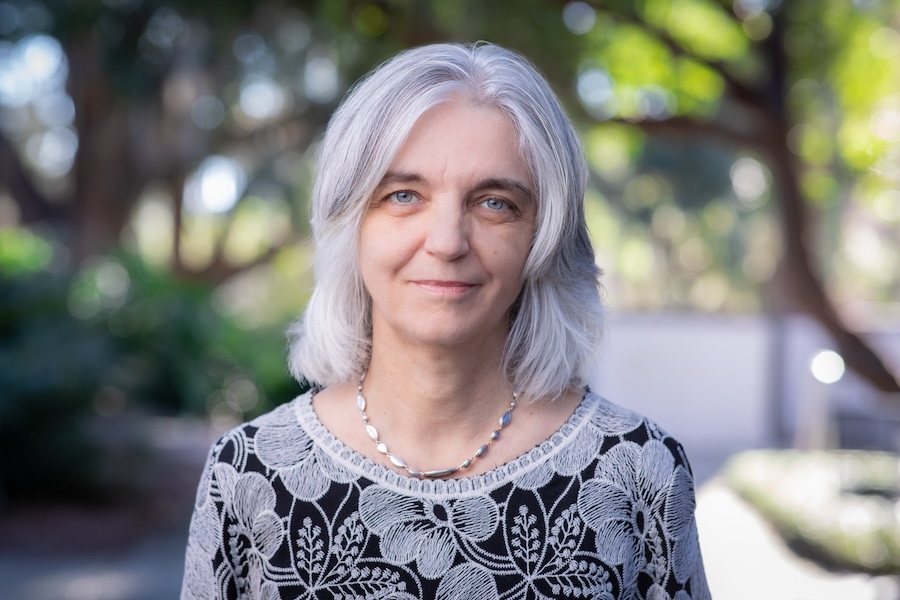Faculty Spotlight: Svetla Slaveva-Griffin

Svetla Slaveva-Griffin is a professor in the Department of Classics, part of Florida State University’s College of Arts and Sciences. Originally from Bulgaria, she received her bachelor’s in classical philology from the University of Sofia in 1992 before relocating to the U.S. to attend the University of Iowa and earning her doctorate in classics in 2000. One year later, she joined FSU’s faculty as an assistant professor. Slaveva-Griffin specializes in three primary research areas: philosophy of mathematics, natural philosophy and history of education. She is currently directing an international research group of philosophers, mathematicians, and historians of philosophy from Europe and North America at the Institute of Advanced Studies Gaetano Massa in Rome.
Tell us a little about your background and what brought you to FSU.
Growing up in Bulgaria, my background is diverse in life experiences, educational systems and intellectual interests. I originally trained to be a ballerina but instead fell in love with the ancient heritage of my country and became a classics professor. “The wind of change” in the early 1990s brought me to the U.S.
Can you break down your current areas of research for us?
The philosophy of mathematics is an interdisciplinary field examining the nature of mathematics, its properties, its relationship with other human activities, and what mathematical objects are. In other words, we do not count with numbers; we think with numbers. Natural philosophy is the discipline comprising study of the natural world before it was renamed to physics. Finally, the history of education studies the organization and development of different professional courses of studies, such as general education, liberal arts and more. Researching these areas is important to clearly define the subject’s main point of study and its methods so other disciplines can use them to ask questions and discover new knowledge.
In what ways was lecturing at Accademia Vivarium Novum, a humanities-focused international study center located just outside Rome in Frascati, Italy, impactful?
In Summer 2024, I had the privilege to teach a course on the origin and organization of the liberal studies curriculum at Accademia Vivarium Novum. Uniquely, it offers all its teaching in Greek and Latin. My experience with international students at VN was inspirational and propelled me in a new direction of research focusing on the history of education and liberal arts.
Tell us about your role with the Institute of Advanced Studies Gaetano Massa.
This is my third year serving as a director of our research group. Our goal is to bridge the disciplinary gap between the history of mathematics and the philosophy of mathematics. We learned how to learn from each other, then discovered common ground, and now we are asking common questions. Our topic this year is the relation between numbers and causality: can numbers be considered causes of things? If so, what kind of things can they cause? Our first topic, presented in 2022, examined the relationship between numbers and epistemology, or the theory of knowledge. Some of its research outcomes will be published by Cambridge University Press in the collection of chapters I am editing titled “The Philosophy of Mathematics in Antiquity: Thinking with Number.”
What makes you passionate about classics?
What attracts me most to the study of classics is the discovery of new fields of knowledge within one of the oldest university disciplines. I like to use the intellectual history of the ancient world as a “think box” for understanding the origin and organization of knowledge today.
Tell us about your experience writing and researching for your book “Plotinus on Number.”
I did not find the subject of the book; it found me at the end of my doctoral studies. Originally, I wanted to do a commentary on the treatise “On Number” by Plotinus, a Greek philosopher who lived in Roman Egypt roughly 1,700 years ago. The treatise is an essential text for understanding his metaphysical framework, or the study of reality and existence. It continues the long-lasting interest of ancient philosophers in Pythagoras, an ancient Greek philosopher who considered numbers the building blocks of reality. However, I quickly realized I needed a deeper knowledge on the treatise, which meant I needed to write the book.
Books, as we know, have their own life once they meet their readership. When “Plotinus on Number” came out in 2009, I thought I was done with the subject. But 15 years later, the book came back to me to open many new directions of research. The philosophy of mathematics is not an easy subject for small talk, but it could be if we stop and think about the foundational role of numbers in everything around us.
What is your best memory so far from working at FSU?
My best memory is developing and establishing my two award-winning large lecture courses: medical terminology and ancient science for non-science majors. Generations of undergraduate students have taken them by now. These courses have made classics accessible and relatable to students from all corners of campus: humanities, of course, but also the sciences, pre-med, business administration and engineering.
What is your favorite part of your job?
I love learning from my students to think about what I know in a new, refreshing way.
Do you have any exciting upcoming projects/research or goals that you are currently working toward?
I am currently working on a new translation and commentary on the treatise “On Numbers” by Plotinus who defined a two-tier relationship between qualitative and quantitative numbers. When we count, we think of numbers as representing a certain quantity but not what makes up the number, or the number’s quality. This relationship opened the door for later philosophers to incorporate other practical disciplines such as physics and medicine into their study of natural philosophy.
If your students only learned one thing from you (of course, hopefully they learned much more than that), what would you hope it to be?
Learn to think outside the box and ask questions that open new horizons.
